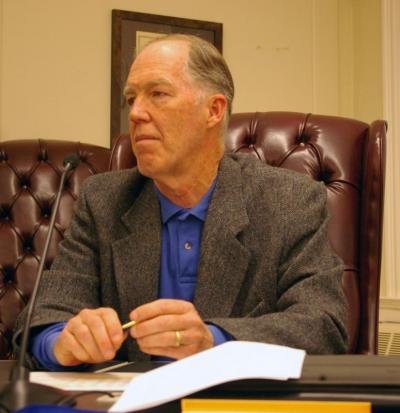School Committee candidate: Geoff Swett
With decades of management experience and nearly six years of School Committee service under his belt, incumbent Geoff Swett is hoping to complete the work he's spent helping to revamp the Wareham Public Schools teachers' evaluation process -- one he hopes will result in positive changes for teachers, administrators, and most of all: students.
His passion for his third term? "Making sure we have great people managing and leading our teachers."
When he was first elected in 2005, Swett had a goal of changing the way teacher evaluations are completed and how compensation is calculated with the hope "to create more incentives for teachers to do well on behalf of the children," he said.
"What I realized at the end of three years was that I was getting lip service because the management of the school district, as well as the [Wareham Education] Association, did not have in place the organization and the relationships that could even allow those evaluations to be done well, let alone tie those evaluations to changes in compensation," he said.
The problem? Teachers were being evaluated by people who did not see them work on a day-to-day basis -- principals. And principals were typically responsible for evaluating approximately 70 teachers.
"The problem with teachers is the people who are in charge of them don't know them," Swett said. "It was not possible to supervise 70 teachers."
Swett, 63, spent nearly his entire career in healthcare, working his way up to president of a multi-billion dollar services division of the world's largest provider of dialysis.
"It gave me a tremendous amount of expertise and sensitivity to the difficulties of trying to manage ... very intelligent, well-educated, idealistic, service-oriented people," he said.
Those people were nurses, "but you could describe teachers that way as well," Swett noted.
So he applied what he knew to the school district.
"The isolation of the teacher ... was what I didn't appreciate in the first three years of being on the School Committee," Swett said. "You cannot implement anything [curriculum changes, etc.] and you cannot fairly evaluate ... if teachers are not properly supervised."
A Labor Management Committee was formed, and, working with Superintendent Dr. Barry Rabinovitch, the Wareham Education Association (teachers' union), and the teachers themselves, Swett helped administrators to change the evaluation process and the organizational make-up of schools.
Those changes included instituting "instructional leaders" at the elementary and middle-school levels. At the high school level, "department heads" were already in place and serve as those leaders.
"We've been working for almost three years ... ahead of state regulations which mandated changes," Swett said.
Two instructional leaders in each elementary school observe and provide feedback to teachers, while one leader and two assistant principals do the same in the middle school, and the high school "department heads" are supervising and evaluating the people in their departments, Swett said.
Instructional leaders still spend time in the classroom teaching in addition to completing evaluations. Assistant principals are now doing more of the evaluations, too.
"We've put in place an organizational structure that now has the ability to properly support the people, [and] properly hold them accountable when they're not doing a good job," Swett said.
The district will eventually discover who its best teachers are and thus, who needs improvement, "because right now, no one really knows," he noted.
That, in turn, means students will be better supported in the education system, Swett said. Swett believes that this could make a big difference in enrollment and standardized test scores in years to come.
"If you drop out of school because you're frustrated, and you've been frustrated since the third grade ... it's the difference between having a productive life and going to jail," he said.
The next challenge, which is out of the School Committee's purview, is to "get the right people into the management positions," Swett said.
Swett also recognizes the immense budget challenges the district faces.
"In the short term, there is nothing we can do about the budget. There are too few resources of fixed costs and variable costs. The combination of infrastructure overhead ... and the rising cost of human resources make it really difficult to change the budget situation at all," Swett said.
Swett said he believes the budget will improve as the economy improves, "because the state will be able to be more generous with their aid."
He is in support of debt exclusions to help the schools in the short term, and says he asks the taxpayers to "try to see education as an investment. ... If you don't do that you'll be contributing to this negative spiral where the community as a whole, not just education specifically, will not get better," he said. "It will get worse."
For the long term, however, Swett said: "I tend to think ... the secret is to increase the number of students that we have."
Aid is based on how many students are in the school system.
"How do you keep students in public schools? Get great results," Swett said -- something he hopes the reorganization of district management will ultimately do. "You get great results so people want to come here, they want to have their children educated here, and all those [parents whose] kids are going to charter schools, parochial schools, and even private schools, say, 'Why waste my money ... when I can get great results here?'"
Swett lives on Cromesett Road with his wife, Judy, their five cats, and field breed Irish setter, Dugan.
"I want to continue to make a difference in Wareham education," Swett said. "Ultimately, it will be the parents and the voters who decide whether I really am, but I'm trying."














